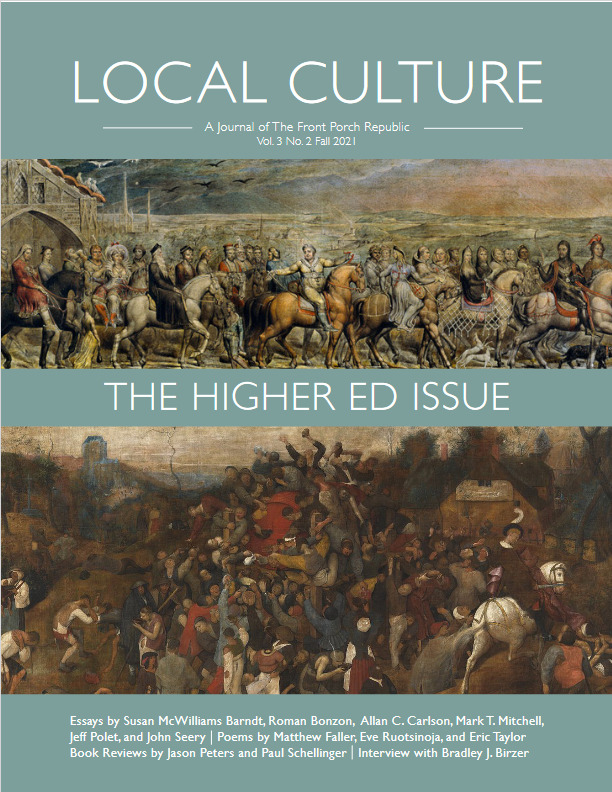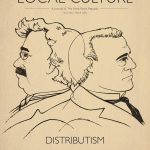Below is the introductory essay to the new issue of Local Culture, which is devoted to the perils and gifts of higher education. If you subscribe by September 13, you’ll receive this issue in your mailbox. You can whet your appetite by perusing the complete table of contents.
When the water-holes were dry people sought to drink at the mirage.
—Evelyn Waugh, Brideshead Revisited
Know thou this, that men are as the time is.
—Edmund, bastard son of Gloucester, in King Lear
Ingham County, MI. In 2016 the Augusta Chronicle ran a cartoon in which a doting father, arm around the shoulder of a young man in cap and gown, asks a perfectly reasonable question: “What did you learn in college?” The father looks every bit the rube: off-the-rack suit, a tie that doesn’t match, and yet a sincere smile and a look of pride. The young man, sporting a scraggly beard, leans slightly away, regarding his father with suspicion. The past four years have apparently earned him the disdain in his reply: “I learned that you are violating my safe space with your hetero-normative, patriarchal abuses and white-privilege microaggressions, Dad.”
If the truth isn’t stranger than satire, it might be more heartbreaking. An old friend of mine told me recently that he sent one of his daughters to the same liberal-arts college he graduated from—and was well-educated by—in the mid- 1980s. “Now she won’t even let me open a door for her,” he says. I know of a professor at a state university whose daughter just earned a Master’s degree in education from an Ivy-League school. He’s a thirty-year veteran—and a veritable Nathaneal—of the academy. But his decades of teaching and all his scholarship don’t measure up to her brief “training”: she is now so smug, condescending, contrary, and self-assured that he can barely stand her company.
These are examples of education as parricide; apparently it can be conducted without remorse or consequence.
But forking out a lot of money for your own execution is an idea without legs. Parents will not suffer gladly their transmogrification into the clueless father in the cartoon, nor accept the mendacious claim that the son’s reply is an example of “critical thinking.” They won’t go on forever writing checks to have their children alienated from them and initiated into the disorders of the age.
A rehearsal of those disorders is not to the purpose here, though I will come to one of them presently. Perhaps it is fitting to recall an ancient dictum: that one purpose of education is to liberate us from the tyranny of the present. But if “men are as the time is,” as Edmund claims, then higher education has no chance of liberating anyone from anything, not as long as professors persist in their abject obeisance to the news cycle and to intellectual fad. If they cannot rise above the fashionable jargon inside the tower and the newsroom mind-control outside it, the present will surely be their despot, and they in turn will do aught but obsess about what isn’t their business and neglect what is, as indeed many already do. In short order higher education will become yet another thing reduced to politics and the media suited to its simplifications: that is, to the placards and bumper stickers of the morally outraged. Meanwhile, substantive ideas concerning education that descend to us from venerable men and women will get little or no airing, for these have only described the world, when obviously the point is to change it into what The Planners (who plan to be in charge) want it to be. And their magic is more impressive than any alchemist ever imagined: they have turned the gold of liberal learning into the lead of idiocy. They call to mind that cowardly hand-washer as Francis Bacon imagined him: “‘What is truth?’ said jesting Pilate, and would not stay for an answer.”
***
But if you inquire after truth and stay long enough for an answer, you might hear more than the New York Times on how climate change is affecting the texture of soufflé in SoHo, much to the consternation of the soufflé aficionados in SoHo who want to know what other people are going to do about climate change. You might hear something that was actually uttered before last Tuesday—Plato on polypragmosyne, for example (the “meddlesomeness” that campus busybodies might profitably learn about), or Aristotle on habituation. You might even hear John Henry Cardinal Newman on the topic of the Stagirite, that very “oracle of nature and of truth”: “In many subject-matters, to think correctly, is to think like Aristotle; and we are his disciples whether we will or no, though we may not know it.”
Newman, by dint of being redoubtable, is without honor in his own country and ours. He was at some pains in The Idea of a University to puzzle out the telos of education. In his fifth discourse he raised the question of whether there is any utility—any extrinsic value—to a liberal education. And the answer he gave was No. There is a kind of knowledge, he argued, that is capable of being an end in itself. “Reason is the principle of that intrinsic fecundity of Knowledge, which, to those who possess it, is its especial value, and which dispenses with the necessity of their looking abroad for any end to rest upon external to itself.” On this view a university is a “place apart,” as Michael Oakeshott said, where a student, delivered from the distractions and trivialities of the moment, may be “moved by motivations of what he has never dreamed” and “invited to pursue satisfactions he has never yet imagined or wished for.” It is a place of repose and contemplation, a place where knowledge is not so much produced as rested in. But as Oakeshott says, it “can prosper only if those who come are disposed to recognize and acknowledge its particular invitation to learn. Its present predicament lies in the circumstances that there is now so much to obstruct this disposition.” Consider that the obstructions have been set up by the very custodians of the university, and you get a sense of how dire the predicament is.
The custodians will argue that we are only now discovering what a university is actually for, but all they are really doing is submitting to the present tyranny, and they have pulled the plug on the educational bathwater with no regard for the baby in it. Hence the disdainful graduate in the cartoon. That he might be grateful instead— grateful for having been introduced to Boethius or Unamuno or for having been invited to pursue satisfactions never yet imagined or wished for— does not occur to them. Gratitude does not occur to them. Debunk, deconstruct, destroy.
And so the Sisyphean challenge before us is to resuscitate the likes of Newman, for whom
Knowledge is a state or condition of mind; and since cultivation of mind is surely worth seeking for its own sake, we are thus brought once more to the conclusion, which the word “Liberal” and the word “Philosophy” have already suggested, that there is a Knowledge, which is desirable, though nothing come of it, as being of itself a treasure, and a sufficient remuneration of years of labour.
Sister Miriam Joseph, in The Trivium: The Liberal Arts of Logic, Grammar, and Rhetoric, proffered an apt illustration of this very point. Whereas a utilitarian art such as stone-cutting or carpentry is an activity that crosses over from the artist to the object, its purpose being therefore to perfect the object (a beautiful headstone or a well-made table), the practice of a liberal art, by contrast, does not “cross over”; its purpose is to perfect the one who practices it. If a carpenter planes a piece of wood, she said, the action passes from the carpenter to the wood, and the wood is perfected in the act. But if a rose blooms, the action does not pass from the rose to anything else; the rose itself is perfected in the act of its own blooming. This is the abiding difference between a utilitarian and a liberal art: one is transitive, the other intransitive. One has a use that is external to the artist; the other, as Newman claimed, does not.
Contrast this—the refusal to admit of an external use—to the burgeoning guaranteed-income approach. Forbes reports that a “small liberal arts college in Rock Island, Illinois, will be the first college in the U.S. to test the concept of degree- or income-insurance for its graduates.” By means of a partnership with a company called Degree Insurance, the college
will offer a guarantee of post-graduation income to the first 20 new transfer students who apply and are admitted between July 15 and August 23, and enroll for fall of 2021. The 20 students covered by the deal will have the average annual income for their academic field guaranteed for the first five years after graduating.
Whether this is a bolder and more daring recruitment strategy than adding women’s varsity bowling only time will tell. But make no mistake: this is liberal education in default mode, in full retreat, a white flag flapping in the breeze. Not only does it admit of an extrinsic value; it admits of nothing else, and no rose blooms.
(The good news, however, is that the future, which until now has been so niggardly with its certainties, at last comes with guarantees. “Imagine welcoming your student to a guaranteed future,” reads the Degree Insurance tag line.)
Newman, when pressed to articulate an immediate end for education, allowed that a university education
is the great ordinary means to a great but ordinary end; it aims at raising the intellectual tone of society, at cultivating the public mind, at purifying the national taste, at supplying true principles to popular enthusiasm and fixed aims to popular aspiration, at giving enlargement and sobriety to the ideas of the age, at facilitating the exercise of political power, and refining the intercourse of private life.
That kind of education … well, consult the excerpt on the back cover to see how the passage ends. It won’t fit on a flyer from the Admissions Office or on a self-congratulatory banner looking down on a campus sidewalk. And there’s nothing in it about a daughter who has risen above her father’s courtesy.
***
I said above that parents will not bankroll colleges to initiate their children into the disorders of the age, but of course we must make allowances for those parents who are themselves initiates already. Some of them are faculty members peddling a flimsy minority view of reality as if it were Mosaic law.
Consider one disorder of the flimsy, not to mention demeaning (I had almost said “infantilizing”), view. A once-venerable Christian liberal-arts college near me—now a highly productive factory of disorders—trains its students in what is called the “Gender Unicorn.” Look this mythical being up if you think you’re reading fiction. The Gender Unicorn’s message, cast as a kind of flow-chart pitched for viewers almost ready for Sesame Street, putatively puts whatever sexual confusions we might suffer from—and we all know there will be suffering and confusion where sex is concerned—into perfect order by a method at once both rich and rare: expansion through reduction. Reduce the human animal to a bundle of desires, then expand the objects of its desires to infinity—with no means of tutoring it in those desires. In fine, this is uninstructed desire unleashed, and not even Ovid, much less St. Augustine, is listed as a consultant.
Lest there be any misunderstanding, I am not saying anything about the morality or immorality of any imaginable sexual coupling. I am getting at something altogether different.
At this liberal-arts college that adults write checks and make donations to, the Gender Unicorn teaches students this: that the human person is a creature who (1) has a gender identity that may or may not be different from (2) its gender expression but (3) has a sex “assigned at birth” that may or may not be male or female. (Science may be “real,” but a Y chromosome is a mere nuisance of fact that desire makes short work of). Now this human creature suffers but two kinds of attraction, physical and emotional, and the available objects of these attractions multiply according to the identities, expressions, and assignations mentioned above. Man (or woman or other) is a lodestone in an expanding universe of iron shavings. And this is liberation. This is freedom. Not far behind it, as we know from experience, and gaining ground quickly, is a horde of inalienable rights in full-blown proliferation. Don’t worry that the institution defaults on its obligation to provide a philosophical and theological apparatus for understanding or talking about desire, liberation, freedom, or rights. Such an apparatus is outside the purview of an education that has been reduced to politics—that is, turned into a billystick. Stanley Fish could tell academics to save the world on their own time, but the world-saving academics have discovered how much easier it is to save the world than to master a subject and teach it. Education is now another one of their playgrounds; it is their eugenics lab, and the students are their rats.
Allowing that the human person is a bundle of complexities that can often register as the static and buzz of a transistor radio unable to pick up a signal; and allowing that this is especially so for young people, many of whom have been raised in the brothels of mass media; and allowing for the rare cases of actual gender dysphoria, which I am certainly willing to allow for—if at the same time I may note the immense amount of attention that this dysphoria garners for suggestible children who have had the bad luck of being born into an ecosystem of narcissistic technology that fairly fertilizes dysphoria; allowing for the unplumbed mysteries of environmental influences and better living through Prozac, Ritalin, Adderall, hormone therapy, glyphosate, and other wonders of chemistry; allowing also for the non-negotiable demands of charity, which I believe we must insist on—allowing for all of that, this is what students at a Christian liberal-arts college are being trained in? The Gender Unicorn?
“What did you learn in college?”
“I learned about an imaginary animal kaleidoscopically sexualized for young adults at least some of whom were under the apparently mistaken impression that when they left home for college they were setting out in search of their intellectual fortune, a fortune awaiting them in the works of Homer and Averroes and Julian of Norwich— among other non-imaginaries.”
Bear in mind that this is happening at a place where, once upon a time, men and women were thought to occupy the grand isthmus of a middle state between beast and angel, all of them crowned with honor and majesty, if indeed recovering from
man’s First disobedience, and the Fruit
Of that Forbidden Tree, whose mortal taste
Brought death into the world, and all our woe
Why cross the desert to the distant waterholes when you can drink at the mirages nearby?
You may say, if you like, that the crippling effects of supermarket choice have stormed the citadel of the bedroom. But something worse than turning young people into mere consumers of satisfaction has happened: an ancient judgment has been overturned. No longer is the object chosen more important than the mere proliferation of options; no longer is the object chosen more important than the “freedom” to choose. Nor is there any distinction between freedom to and freedom from desire. Desire macht frei.
I pause for emphasis: it is now better that desire be unleashed than that it find its suitable object. At least George Herbert, the great poet of Bemerton, would have us set loose “with repining restlessness.” But then what he had in mind wasn’t uniformity disguised as diversity. The end he had in mind was union with God. And the pulley he imagined mankind to depend from, that simple machine of ascent, did not assume an economy for swingers.
***
That general education curricula—the core or base of a given college’s requirements—are in disarray is news to no one who thinks a common culture is necessary for cultural cohesion and comity. Professors who are vexed by this disarray tend to be those who have read widely in old books and who have more than a passing acquaintance with modern and ancient languages. But they are easily in the minority now, and to many of their colleagues they are bigots and snobs by default, for by now it is heretical to assume there is an actual what to what students should know. The prevailing doctrine goes something like this: give the students something—anything—to study, the more pre-professional the better; don’t make it difficult, because you need their money, and their failure cuts you off from it; give assurances that their course of study will cohere in one very important way: it will add up to unlimited personal opportunities for self-actualization, which a paycheck will be an important part of; and, above all, infuse the whole enterprise with the pseudo-religious principles of tolerance, which, if applied selectively, will provide the final synthesis that theology, the erstwhile Queen of the Sciences, performed of old.
The final synthesis, the pseudo-religious element of tolerance applied selectively, is especially important, because education is no longer Newman’s “great ordinary means to a great but ordinary end”; it is an agent of social change and little else. Change is what education is for, for change is the sort of thing that can go on forever, especially if you never accomplish the things you say you want to accomplish. And you never will accomplish them because you don’t really want to, for that would mean closing up shop. This is ever and anon the perverted benefit of failure and malpractice. As Heather MacDonald has pointed out, now that Diversity, Equity, and Inclusion has become an actual college major—that’s right: you can major in DEI and then offer your services to the DEI industry, for which success would obviously be suicide—a thing can thrive just fine on its own failure. In fact it cannot thrive without its own failure. Casinos and gambling hotlines should hope for a business relationship as mutually beneficial as this.
But this conception of education—that it is primarily an agent of social change—is antithetical to liberal learning as Newman and others defined it, for it means that there must in fact be an end external to the enterprise. Currently that end is tangled up with such ill-defined tags as “equity” and “justice.” Once equity and justice have been achieved to the satisfaction of their champions, once all bigotry has been eliminated, including the bigotry of classicists and historians who think accounting majors could benefit from a little Thucydides, and once the regnant anthropology that educators subscribe to has usurped all other conceptions of personhood (that humans are perfectible rather than perfidious), it follows that something at least as good as Edward Bellamy’s covered sidewalks is in our future. So we speed toward them as if we weren’t created a little lower than the angels.
But there are two problems with education as mere agent of social change. One is that it means that The Changers, once they get the change they want, will have to resist all change. This means that they will have to become conservatives, which of course would be intolerable to them.
The other problem is that it’s wrong. On an older view of education and its “particular invitation to learn” and to pursue satisfactions never yet imagined or wished for, we start again, anew, with each person, whose personhood cannot be collapsed into a dog’s lunch of desires clarified by a flow-chart or a horned horse. There is a what to what each person should know, and that what corresponds with reality. It is not a reality-optional proposition. And so to conform yourself and your desires to what-is rather than attempting to conform what-is to yourself and your desires; to master not subjects but, rather, by means of mastering subjects to master the self (which is what an older age understood by paideia); to order love properly; to be tutored in desire; to value the thing chosen over the fact of having a choice; to know material, formal, efficient, and final causes; to be oriented by true ends; to know the chief end of man—to know all this and much more, including the reason the caged bird sings and the deferred dream explodes and what the crocodile has for dinner—to know all this requires that when asked “what should students know?” you don’t take a knee.
Not that the people destroying higher education aren’t asking this question. They are. But they are proffering exceedingly bad answers, one consequence of which is the creation of an electorate—recruits trained in the cause—of very poorly educated people. Members of this voting bloc are deficient in rhetoric and dialectic; they have been told that grammar, the bedrock of the trivium, is an instrument for retaining power and revenue and that its purpose is enslavement. (Just recently, after more than thirty years of teaching in apparent darkness, I learned that students are now entitled to “linguistic justice”: the right to their own language. Dock the wrong kid for a faulty subject-verb agreement and see what happens.) They do not know the outlines of history, philosophy, or theology. They don’t know the great stories and poems by means of which man understands himself and others and the mess he makes of his life. They are so biblically illiterate that they wouldn’t know what a “veritable Nathaneal of the academy” is. They are especially ignorant of the depravity they suffer from and the grace they stand in great need of. They are ignorant of the world’s religions, but in accord with the Voegelin doctrine of preferring certain untruths to uncertain truths they are certain that all religions are better than Christianity, the one that actually gives them an anthropology so scrupulously articulated that it obviates the need to “cultivate humanity.” Science to them is the very Oracle of Oracles. But knowing its history, including the history of its failures, and knowing the metaphysical assumptions it rests on would be inquiry of the most impudent and irreverent kind, to say nothing of the effrontery it would pose to millions of yard signs. Freedom means there should be no restraints on individual desires, lest desire after desire be frustrated, and life prove nasty, brutish, and short. Virtue is for signaling. Tocqueville, far from being someone who can map out the landmines buried in a democracy, is a place just up the road from Margaritaville, equally suitable for wasting away in.
In fine, they have no common culture. They cannot even agree on what evidence consists in, as if the final score of last year’s Super Bowl is a matter of opinion. And yet The Planners—from whom all this incoherence issues—insist that providing a citizenry with no common culture beyond a dubious revisionary history project is a good strategy for ushering in the New and Improved Republic.
In fact it is a recipe for unrest, disunity, ill- will, distrust, and rancor. I might add to that list the transformation of the fourth estate into mere advocacy, if not mendacity. The buzzwords of “forward thinking” and “looking ahead” and “preparing for the future” have deafened The Planners to any tuition the past might have provided them with. They’re suckers for whatever rough beast, its hour come round at last, slouches toward Madison Ave to be born.
And so it occurs to me that Local Culture might take arms against this sea of bubbles and by opposing pop them.
A common theme in the literature of academic complaint is how incurious students are. This is a legitimate complaint, of course, but too often it fails to identify a principal cause: the education on offer is not worth being curious about; it is a tuition that offers no meaning to people who need it desperately, many of whom even want it. It is a breakfast of Tang and powdered eggs offered to people made for orange juice and omelets. Let us give them food, not food substitutes, before the evil days come— if they aren’t upon us already.








2 comments
EJ
This morning I asked why Donne’s initial subordinate conjunction in Valediction was so cool and a student, so immediately eager, raised her hand to tell me my classroom phone was ringing.
Each day I misremeber Wharton and see before me the accumulated wreckage of passion and splendor.
Unrelated, and now too far removed, please pretend you received my snarky Milwaukee Bucks email when I sent it. Please assume it contained a surfeit of good humor.
Aaron
Touche, Jason. I find myself musing about my own place in higher ed, in light of Rieff’s dictum that “where nothing is sacred, there is nothing.” In combination with your observation that student in-curiosity isn’t entirely a student problem, I wonder if there’s actually anything I can do about that. If there is, my institution certainly won’t celebrate it. We’d rather have in-curious-but-paying students, than import anything “higher” back into higher ed.
Comments are closed.